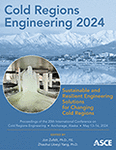Methodologies for Quantifying Installation-Community Resilience in Cold Regions
Publication: Cold Regions Engineering 2024: Sustainable and Resilient Engineering Solutions for Changing Cold Regions
ABSTRACT
The dynamic challenges posed by climate-driven threats indicate an acceleration in complexities surrounding the planning, construction, and maintenance of infrastructure within cold regions installations and their proximate communities. It is imperative for installations, including military posts, bases, and facilities, situated in these regions, to enhance their capacity to address the resilience of critical infrastructure while gaining a comprehensive understanding of the risks entwined with mission-critical functionalities. The proposed approach emphasizes a combined community and installation understanding of threats affecting missions through infrastructure. It seeks to identify prospective interventions geared towards risk reduction and resilience amplification. To develop a systematic assessment, we draw upon existing approaches and data on projected climate-driven hazards, incorporating interdependencies between infrastructure systems, installation capabilities, and nearby communities for our new start resilience project. This assessment focuses on a specific installation and its surrounding community infrastructure exposed to unique and compounding threats in cold regions environments. The purpose of this paper is to highlight existing tools and methodologies applicable to installation resilience assessments such as the Mission Dependency Index (MDI) and Mission Assurance Assessment (MAA), with modifications addressing not only asset management concerns but also other dependencies, including the surrounding communities in cold regions.
Get full access to this chapter
View all available purchase options and get full access to this chapter.
REFERENCES
Affleck, R.T., Gardner, K., Aytur, S. Carlson, C. Grimm, C., and Deeb, E. (2019). “Sustainable Infrastructure in Conflict Zones: Police Facilities’ Impact on Perception of Safety in Afghan Communities.” Sustainability 11, 2113;.
Antelman, A. (2008). “United States Air Force Mission Dependency Index (MDI) Proof of Concept Report.” Port Hueneme, California: Naval Facilities Engineering Service Center.
Burton, H. V., Deierlein, G., Lallemant, D., and Lin, T. (2016). “Framework for incorporating probabilistic building performance in the assessment of community seismic resilience.” Journal of Structural Engineering, 142(8), C4015007.
Cimellaro, G. P., Renschler, C., and Bruneau, M. (2015). “Introduction to resilience-based design (RBD).” In Computational methods, seismic protection, hybrid testing and resilience in earthquake engineering (pp. 151–183). Springer, Cham.
DePalmer, D. M. (2021). “A Fuzzy Framework for the Air Force Mission Dependency Index.” Theses and Dissertations. 4942. https://scholar.afit.edu/etd/4942.
DOD (Department of Defense) Directive 3020.40 Mission Assurance (MA). (2018a). https://www.esd.whs.mil/Portals/54/Documents/DD/issuances/dodd/302040p.pdf?ver=2018-09-11-131221-983.
DOD (Department of Defense). (2018b). DOD Mission Assurance Assessment benchmarks. Washington, DC: DOD.
FEMA (Federal Emergency Management Agency). (2022). Recovery Strategy: Summary of planned and proposed recovery projects contributing to a whole-of-community recovery in the area of western Alaska impacted by the remnants of Typhoon Merbok (DR-4672-AK).
Fish, A. B., (2021). “Overcoming Flaws in the Mission Dependency Index (MDI) with Network Flow Analysis” (Doctoral dissertation, Monterey, CA; Naval Postgraduate School).
Fox-Lent, C., Bates, M. E., and Linkov, I. (2015). “A matrix approach to community resilience assessment: An illustrative case at Rockaway Peninsula.” Environ. Syst. Decis. 35 (2): 209–218.
Galaitsi, S. E., Keisler, J. M., Trump, B. D. and Linkov, I. (2021). “The need to reconcile concepts that characterize systems facing threats.” Risk Analysis, 41(1), pp.3-15.
Grussing, M., Gunderson, S., Canfield, M., Falconer, E., Antelman, A., and Hunter, S. (2010). “Development of the army facility mission dependency index for infrastructure asset management.” US Army Corps of Engineers Engineer Research and Development Center – Construction Engineering Research Laboratory. ERDC/CERL TR-10-18.
Ikpong, A. and Bagchi, A. (2015). “New method for climate change resilience rating of highway bridges.” Journal of Cold Regions Engineering, 29(3), p.04014013.
Ip, W. H., and Wang, D. W. (2011). “Resilience and friability of transportation networks: evaluation, analysis and optimization.” IEEE Systems Journal, 5, 189-198.
Jorgenson, M. T., Romanovsky, V., Harden, J., Shur, Y., O’Donnell, J., Schuur, E. A., Kanevskiy, M. and Marchenko, S. (2010). “Resilience and vulnerability of permafrost to climate change.” Canadian Journal of Forest Research, 40(7), pp.1219-1236.
Kain, A., Van Bossuyt, D. L. and Pollman, A. (2021). “Investigation of Nanogrids for Improved Navy Installation Energy Resilience.” Applied Sciences, 11(9), p.4298.
Kumar, N., Poonia, V., Gupta, B. B. and Goyal, M. K. (2021). “A novel framework for risk assessment and resilience of critical infrastructure towards climate change.” Technological Forecasting and Social Change, 165, p.120532.
Kurth, M. H., Keenan, J. M., Sasani, M., and Linkov, I. (2018). “Defining resilience for the US building industry.” Building Research & Information, 47(4), 1–13.
Linkov, I., Bridges, T., Creutzig, F., Decker, J., Fox-Lent, C., Kröger, W., Lambert, J. H., Levermann, A., Montreuil, B., Nathwani, J. and Nyer, R. (2014). “Changing the resilience paradigm.” Nature Climate Change, 4(6), pp.407-409.
Masoomi, H., and van de Lindt, J. W. (2019). “Community-resilience-based design of the built environment.” ASCE-ASME Journal of Risk and Uncertainty in Engineering Systems, Part A: Civil Engineering, 5(1), 04018044
Olsen, J.R. ed. (2015). Adapting Infrastructure and Civil Engineering Practice to a Changing Climate. American Society of Civil Engineers, Reston, VA.
Si, W., Ma, B., Li, N., Ren, J. P. and Wang, H. N. (2014). “Reliability-based assessment of deteriorating performance to asphalt pavement under freeze–thaw cycles in cold regions.” Construction and Building Materials, 68, pp.572-579.
Smith, C. W. (2016). Mission dependency index of air force built infrastructure: Knowledge discovery with machine learning. Air Force Institute of Technology Wright-Patterson, United States.
Winfield, E. C., Rader, R. J., Zhivov, A. M., Adams, T. A., Dyrelund, A., Fredeen, C., Gudmundsson, O. and Goering, B. (2021). “Best practices for HVAC, plumbing, and heat supply in Arctic climates.” ASHRAE Transactions, 127(1)., https://annex73.iea-ebc.org/Data/Sites/4/media/papers/VC-21-007_Preprint.pdf
Wied, M., Oehmen, J., and Welo, T. (2019). “Conceptualizing Resilience in Engineering Systems: An Analysis of the Literature.” Systems Engineering, 23(1), 3-13.
Zhang, X., Miller-Hooks, E., and Denny, K. (2015). “Assessing the role of network topology in transportation network resilience.” Journal of Transportation Geography, 46, 35-45.
Information & Authors
Information
Published In
History
Published online: May 9, 2024
ASCE Technical Topics:
Authors
Metrics & Citations
Metrics
Citations
Download citation
If you have the appropriate software installed, you can download article citation data to the citation manager of your choice. Simply select your manager software from the list below and click Download.
